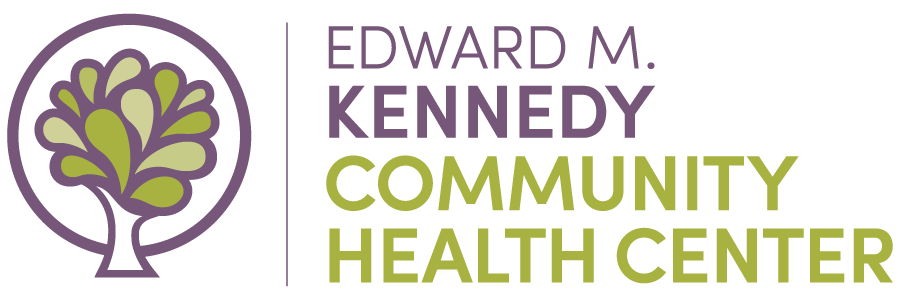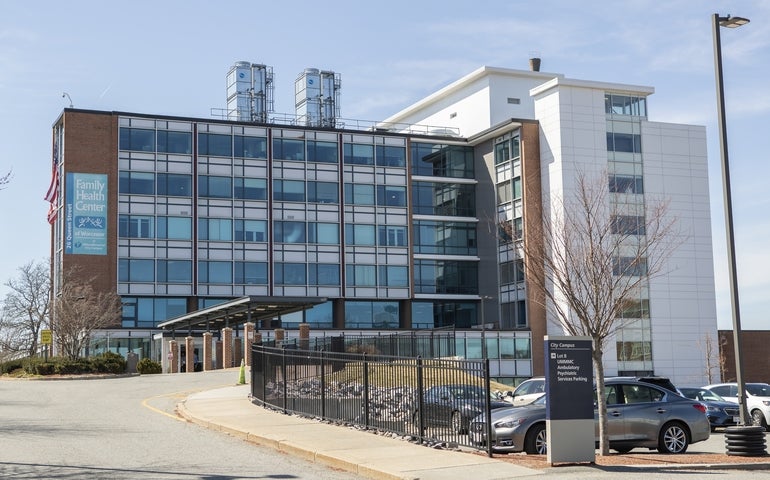WORCESTER — Stephen Kerrigan embraces challenges.
Kerrigan became president and CEO of the Edward M. Kennedy Community Health Center in July 2019, and since then, and especially over the last seven months, the center has faced challenges, obstacles and changes, but also taken pride in the way it has continued to provide quality health care to its 29,000 patients throughout the coronavirus pandemic.
“Has the last year had some challenges?” Kerrigan, who grew up in Lancaster and graduated from St. John’s High in 1989, said. “Sure, but as I say all the time to folks, ‘Challenges are just opportunities to do things a little differently.’”
In the United States, 1,400 community health centers provide affordable care for almost 30 million people at 12,000 sites. In Massachusetts, more than 1 million residents rely on community health centers as their primary care providers. The Kennedy Community Health Center, which was founded as the Great Brook Valley Health Center Inc. in 1972, is one of 38 federally-qualified community health centers in the state.
As millions of Americans have lost their jobs during the pandemic, they have also lost their employer-sponsored health insurance.
“We are more important now than ever before,” Kerrigan said.
The Kennedy Community Health Center, which was renamed in 2010, has, over the last 48 years, grown exponentially with new facilities and services in Worcester, and additional sites in Framingham and Milford. Kennedy Community Health has three medical facilities, two optometry sites, two dental practices and six school-based health center sites.
Kennedy Community Health serves a diverse patient population from 90 communities, Jose Ramirez, the Worcester location’s vice president of operations, said.
In 2019, 14.9% of Kennedy Community Health’s patients resided in public housing. Additionally, 90% are considered low income, 30.5% are uninsured and 39% are insured by MassHealth. Kennedy Health’s patients speak 92 different languages.
As the pandemic hit and shut down the state in March, Kennedy Community Health remained resolute in its mission of providing high-quality and inclusive care to the most vulnerable in its communities.
Preparation, communication, organization and diligence, Kerrigan said, has allowed Kennedy Community Health to remain open since the pandemic began while ensuring continuity of care and safety in the community, effectively serve many patients via telehealth, stay on track with its pre-COVID budget, and avoid any employee layoffs and/or furloughs due to lost revenue.
The Kennedy Community Health Center employs a total of 362 people, 262 in Worcester.
“For us,” Kerrigan said, “it was about how to step up and prepare and not colossally shut down access for our patients. Knowing this pandemic was on the way, we knew we had a responsibility to look at the critical things we provide, which is access to health care. How do we do it? We do it through our people and we do it through our facilities.
“We felt if we sort of cradled in on ourselves rather than look for opportunities to remain strong and keep growing in a clinically appropriate and safe manner,” Kerrigan said, “when this was all over with we would be way far behind. Instead we’ve really kept apace and continued to have access and opportunities for our patient population and community at large.”
In Worcester, Kennedy Community Health served 4,326 patients in March and 4,723 patients in September.
September 2020 medical visits in Worcester were up by 32.7% and behavioral health visits were up by 25% over last year’s visit numbers for the same time period. Visits for the entire organization this September were up by almost 18% compared to the same time period for 2019.
According to the National Association of Community Health Centers research fact sheets, 816 health center sites across the country were temporarily closed due to COVID-19 as of Sept. 25.
“We never fully closed anything other than optometry, which we do in partnership with Mass. College of Pharmacy and Health Sciences,” Kerrigan said, “So when they closed, we closed, but all of our sites remained at some level open. We decided we weren’t going to do opening and closing phases. We were going to do clinical operational phase adjustments. It’s just how we change with the times and we monitor all of the clinical metrics and made all of our clinical adjustments based on that.”
Currently, 57% of Kennedy Community Health Center’s medical visits are telehealth.
Kerrigan said Kennedy Community Health began tackling the issue of its technological infrastructure about a year ago, which was critical in the shift to telehealth in March.
Behavioral health services moved to telehealth very quickly and currently 100% of the center’s behavioral health visits are via telehealth.
“We needed to decide quickly, ‘Who can be seen on site? Who can be seen via telehealth? Who might we postpone a little bit until things get a little safer?’” Kennedy Community Health Center COO Leah Gallivan said. “All of the logistical things of getting in touch with patients, telling them how a visit would happen, how you check in a patient, how you document a telehealth visit, the process of seeing patients via the phone or on video had to be laid out. Within a week we pulled all of that together. That’s because everyone was working together. Everyone pitched in because they knew the importance of making this happen.”
“We focused very much on our people,” Kerrigan said, “because our people are a huge part of who we are as a team and how we provide that access to care. I think by investing in our organization and our staff, it allowed us to remain strong.”
Some members of the dental staff, Kerrigan said, helped manage traffic control at the pharmacy, which expanded its waiting area on the third floor of 19 Tacoma St. when behavioral health services went remote. Employees of Kennedy’s school-based centers worked at the call center or helped with contact tracing.
“When you’re in community health,” Kerrigan said, “you’re always adapting, but adaptation was the rule of the day and it remains. We’re not done. We’re in this for a very long time.”
According to the Kennedy Community Health Center’s 2019 annual report, 69% of its operating revenue came through patient services, 26% through grants and contracts, and 3% through donated goods and services. Salaries and wages accounted for 53 percent of its expenses.
In April, the U.S. Department of Health and Human Services, under the CARES Act, awarded more than $34 million in grants to community health centers in Massachusetts, and, in May, $16 million in federal grants through the Expanding Capacity for Testing Program.
Kennedy Community Health received close to $1.8 million in federal grants in March and April, the majority of which was restricted to addressing COVID-19 and expanded access to testing.
Like it was for many, PPE was a challenge for Kennedy Community Health Center early in the pandemic.
“In the beginning there was a crunch because everybody was caught off guard,” Candice Richardson, vice president of nursing and clinical support services, said. “Most vendors were restricting and allocating their PPE. When we put in orders, it was a very limited amount we could get.”
Community support from Mutual Aid Worcester — Mask Making, Masks Made with Love MetroWest, Mask Steers, St. Rose of Lima Parish, area dental practices such as Atlantis Dental, and Cinnamon & Hubley Dental Practice, among others, helped.
“We stabilized PPE within 30 days,” Richardson said, “and we’ve continued to be stabilized with PPE.”
Kennedy Community Health has tested 2,325 patients for coronavirus to date (as of Oct. 6), with 734 positives, 1,410 negatives, 103 pending and 78 not tested (showed symptoms but didn’t follow through with a test). The largest age group testing positive was 30-49.
The Kennedy Community Health Center has partnered with the city of Worcester for several of its free coronavirus testing events.
The Kennedy Community Health Center has received positive feedback from its patients during the pandemic.
“Patients are tremendously reassured to know that we’re open,” Dr. Anna McMahan, medical director at Kennedy Health in Worcester, said, “and hearing patients say, ‘I’ve been feeling sick and I can come in and you can see me. I’m so glad you could see me here,’ or if the visits are by phone, ‘I’m so happy you’re able to do it by telephone.’ There are a number of ways to provide patients access to care, (such as) getting their flu vaccines done outside in a tent if they’re not comfortable coming in. Our patients are incredibly grateful and patient and understanding. We are literally and figuratively a large cornerstone of a community, and our patients have been very happy to have access to all the services we offer them.”
There is anticipation, of course, of a second wave of COVID-19 this winter.
Kerrigan is confident Kennedy Community Health will be ready.
“We met the moment when we weren’t aware it was coming,” Kerrigan said. “Now that we know it’s coming — and we’d be silly to think it’s not coming — we are prepared today to meet the moment. It’s been an incredible experience and it’s an ongoing amazing experience, but no one here assumes we’re in the final act of anything. We’re constantly updating our procedures.”
For more than a decade, Kerrigan served as a senior aide to Sen. Edward M. Kennedy, for whom the center is named, and who, throughout his career, was a tireless advocate of health-care reform.
“To have a chance now,” Kerrigan said, “to work every day with these incredible people and bring to life his lifelong and career-long goal of bringing high-quality health care to people who need it is just an amazing opportunity.”
https://www.telegram.com/news/20201011/worcesters-kennedy-community-health-set-to-meet-moment





